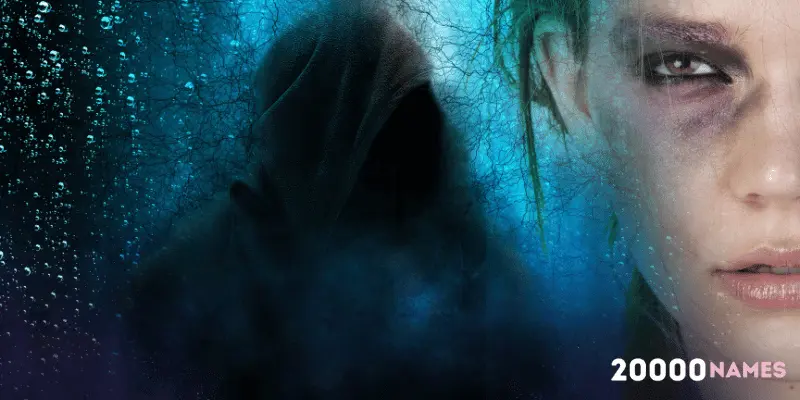Evil Names – Meanings & Dark Origins
Updated: 26 Apr 2024
57
Evil names have always been exciting and have become a part of our collective imagination.
These names have a heavyweight that taps into our deepest fears and interests whether they belong to evil beings, famous historical people, or fictional bad guys.
These Names have held much meaning in many countries worldwide.
They can represent identity, heritage, and even fate. There is, however, another side to naming that makes people feel scared and uneasy.
Names that sound evil have a unique ability to make people scared and curious, and they often reflect the worst parts of people.
25 Evil Names and Dark Origins:

Sound scary! Evil is the fact of the world. Now let’s move to the evil names and their meanings in their respective languages:
- Malice Darkborne (English): Malice signifies ill will or intention. At the same time, Darkborne implies being born or arising from darkness.
- Ravenna Shadowheart (English): Ravenna suggests a dark or mysterious presence, while Shadowheart implies a heart shrouded in darkness.
- Mordecai Grimshaw (English): Mordecai symbolizes a warrior, while Grimshaw connotes bleakness and desolation. In Hebrew: מָרְדֳּכַי גְרִימְשָׁו (Mordecai Grimshev)
- Lilith Nightshade (English): Lilith, often associated with demons, paired with Nightshade, a poisonous plant, creates an image of a seductive yet deadly temptress. In Hebrew: לילית צל חושך (Lilith Tzel Choshech)
- Azazel Blackthorn (English): Azazel is often depicted as a fallen angel, while Blackthorn suggests a sharp, unforgiving nature. In Hebrew: עֲזָאזֵל קוֹץ שָׁחוֹר (Azazel Kots Shachor)
- Morgana Bloodmoon (English): Morgana connotes mystical or magical elements, while Bloodmoon suggests ritualistic sacrifice and occult practices. In Welsh: Morgana Llun Gwaed (Morgana means bright sea, Llun means picture or image, and Gwaed means blood)
- Malachi Dreadborne (English): Malachi means my messenger, while Dreadborne implies a carrier of dread and despair. In Hebrew: מַלְאָךְ הוֹרֵא אֵימָה (Mal’akh Hore Eymah)
- Selena Darkwater (English): Selena suggests a celestial presence, while Darkwater implies murky depths. In Greek: Σελήνη Σκοτεινό νερό (Selene Skoteino Nero)
- Draven Nightshade (English): Draven evokes gothic imagery, while Nightshade implies poison and danger. In Old English: Drāfian Nihtscada (Drāfian meaning to drive or impel, and Nihtscada meaning nightshade)
- Samael Shadowcaster (English): Samael is often associated with the angel of death, while Shadowcaster implies mastery over darkness and manipulation. In Hebrew: סַמָּאֵל מַסְלִיק צֵל (Samael Maslik Tzel)
- Lilithra Doombringer (English): Lilithra combines Lilith with a sense of doom, while Doombringer suggests a harbinger of destruction and chaos. In Latin: Lilithra Nuntiatrix Exitii (Nuntiatrix means messenger or harbinger, and Exitii means destruction)
- Lucian Darkstorm (English): Lucian means light, contrasted with Darkstorm, implying turmoil and darkness. In Latin: Lucianus Tempestatem Obscuram (Lucianus meaning light, and Tempestatem Obscuram meaning dark storm)
- Azrael Nightwalker (English): Azrael, often associated with the angel of death, paired with Nightwalker, suggests a spectral figure haunting the darkness. In Hebrew: עֲזַרְאֵל הַלֹךְ בַּלַּיְלָה (Azrael Haloch Balaylah)
- Seraphina Voidseeker (English): Seraphina implies a celestial being, while Voidseeker suggests pursuing the unknown and abyssal. In Latin: Seraphina Quaerens Chaos (Quaerens meaning seeking, and Chaos meaning chaos or void)
- Damien Shadowfire (English): Damien is rooted in infernal imagery, while Shadowfire evokes darkness and flames. In Latin: Damianus Ignis Tenebrarum (Ignis meaning fire, and Tenebrarum meaning darkness)
- Morrigan Darkthorn (English): Morrigan is a goddess of war, while Darkthorn suggests a connection to ominous nature. In Irish: Morrigan Dorchadas Craobh (Dorchadas meaning darkness, and Craobh meaning tree)
- Valeria Nightshade (English): Valeria connotes strength, juxtaposed with Nightshade, suggesting a poisonous presence. In Latin: Valeria Noctis Venenum (Noctis means night, and Venenum means poison)
- Lazarus Grimblade (English): Lazarus implies resurrection, while Grimblade suggests a blade stained with blood. In Hebrew: לָזָרוּס חֶרֶב חוֹרֶב (Lazarus Cherev Chorev)
- Lilithra Shadowweaver (English): Lilithra combined with Shadowweaver suggests darkness manipulation. In Latin: Lilithra Tenebrarum Textrix (Textrix meaning weaver)
- Dante Darkheart (English): Dante is rooted in infernal imagery, while Darkheart suggests a tormented soul. In Italian: Dante Cuore Oscuro (Cuore meaning heart, and Oscuro meaning dark)
- Morgana Nightengale (English): Morgana paired with Nightengale suggests a figure luring victims with deceit. In Welsh: Morgana Eos Y Nos (Eos meaning nightingale, and Y Nos meaning the night)
- Malakai Bloodthorn (English): Malakai implies a divine messenger, while Bloodthorn suggests a connection to blood and pain. In Hebrew: מַלְאָכַי דַּם קוֹץ (Mal’akhay Dam Kots)
- Seraphina Shadowdancer (English): Seraphina combined with Shadowdancer implies a celestial being dancing in darkness. In Latin: Seraphina Saltator Umbrae (Saltator meaning dancer, and Umbrae meaning shadow)
- Azazel Nightrend (English): Azazel paired with Nightrend suggests an entity bringing about the end under cover of darkness. In Hebrew: עֲזַזְאֵל מַסְתִּיר קֵץ (Azazel Mastir Ket)
- Lilithra Voidwalker (English): Lilithra combined with Voidwalker suggests traversing the abyssal depths. In Latin: Lilithra Abysso Ambulator (Abysso means abyss, and Ambulator means walker)
Conclusion:
At the end of the day, people like evil names. They remind us of the dark themes that run through history and art.
Watch out and wait your turn when you’re with them. They can scare us or make us happy.
They could change how you think about good and bad things. We don’t always know what’s right or wrong.
When things are tough, we call them.
Please Write Your Comments